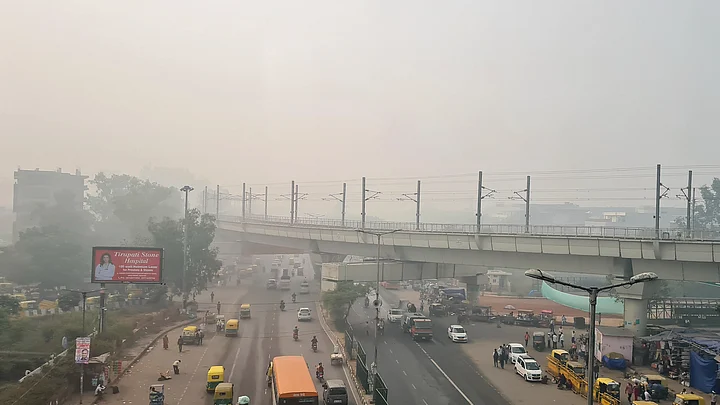Do your bit to support our journalism. Become a member – and help us stay on top of the most important stories.
The fourth phase of Graded Response Action Plan (GRAP) was implemented in Delhi on Sunday, 5 November, and 50 percent of government staff directed to work from home amid rising pollution levels.
Further, the Delhi government extended the closure of primary schools till 10 November. For grades 6-12, the schools have been given the option of shifting to online classes. Delhi Education Minister Atishi tweeted about the development on Sunday morning.
Apart from the GRAP stage 4, provisions of stages 1,2, and 3 will continue to remain in effect.
What is GRAP?
GRAP, or Graded Response Action Plan, is an action plan that is implemented to tackle rising pollution. It includes four stages:
1. Stage 1 - poor (AQI 201-300)
2. Stage 2 - very poor (AQI 301-400)
3. Stage 3 - severe (AQI 401-450)
4. Stage 4 - severe plus (AQI above 450)
What are the provisions of GRAP stage 4?
GRAP stage 4 entails an eight-point action plan which includes stopping the entry of trucks into Delhi except LNG/CNG trucks and vehicles engaged in providing essential services. Further, it involves the banning of Delhi-registered diesel operated Medium Goods Vehicles (MGVs) and Heavy Goods Vehicles (HGVs).
GRAP stage 4 also empowers authorities to take a call on discontinuing physical classes in schools and ordering classes to be conducted through the online mode.
Moreover, the Delhi government can also take a call on implementing additional emergency steps like closing colleges and other educational institutions, stopping commercial activities, and implementing the odd-even scheme for vehicles.
The entry of polluting trucks and commercial four-wheelers can be banned under GRAP 4 as well, and only CNG, electric, and BS VI vehicles from other states allowed to function.
What other steps have been implemented to tackle Delhi's pollution?
On Thursday evening, CM Arvind Kejriwal had announced the closure of schools on Friday, 3 November and Saturday, 4 November.
The Central government on Thursday ordered a ban on non-essential construction work in Delhi-NCR as many residents complained of a sudden spike in the level of smog around them. A thick haze of smoke covered Delhi-NCR on Thursday and has continued since.
What has been the impact of rising pollution on the Cricket World Cup?
Players participating in the Cricket World Cup have had their training disrupted in the national capital due to smog. On Saturday, Sri Lanka cancelled its training session ahead of their match against Bangladesh on Monday in Delhi. Following this, the International Cricket Council (ICC) stated that it is assessing how to handle the situation for the well-being of all the players.
"The ICC and our hosts the BCCI take the wellbeing of all participants seriously and are monitoring the air quality in Delhi…We are taking expert advice to assess the situation," an ICC representative told Reuters.
Prior to this, on Friday, the Bangladesh cricket team had cancelled its training on Friday owing to the toxic air. The Air Quality Index (AQI) dropped from 415 at 4 pm on Saturday to 460 at 7 am on Sunday in Delhi.
As the temperature drops and the country enters the winter season, there is growing concern about the health and well-being of Delhi-NCR residents, that many have expressed on social media.
(At The Quint, we question everything. Play an active role in shaping our journalism by becoming a member today.)
